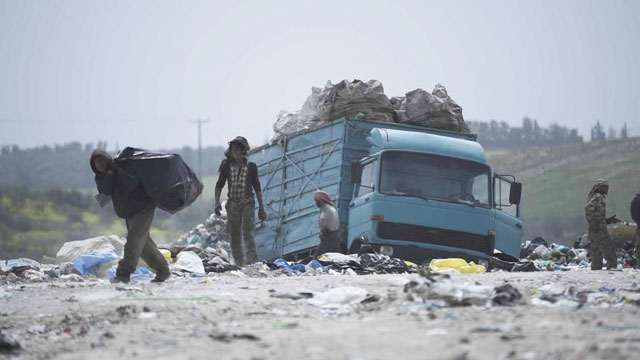AMMAN — An agreement between the UN Development Programme (UNDP) Jordan, the Ministry of Municipal Affairs (MOMA) and the Canadian international development programme (Global Affairs Canada) has helped implement a new standardised work contract to improve the livelihood of people working in waste material recovery and recycling.
“Before this partnership, the waste pickers would work under contracts that did not cover health risks and injury. It did not protect workers against employee violations and abuse, not to mention the lack of legal and human payment regulations,” said UNDP country director Sara Ferrer Olivella.
As part of the “Improving Solid Waste Management [SWM] and Income Creation in Host Communities” project, the new contract ensures the monitoring and evaluation of contractors and private sector investors working in material recovery and recycling at Jordanian landfills.
For most of the people working at landfills, the job is more of a way to survive than a choice, as Nawras Sahasil said.
“It’s not a lot but I make enough to manage,” said the 21-year-old Syrian refugee who supports his wife and two children with JD250 earned from working at the Irbid landfill.
In light of an ever growing public waste management issue at the national level, people have been making use of the huge amounts of trash lying around their area to gain any type of income.
However, this is not without risks, and young Jordanians and Syrian refugees who started working at those landfills have been paying the price both physically and mentally.
“I’m not happy with my employer’s treatment, work environment and wage. I feel rejected at work and by my family and friends,” explained Samer, a 15-year-old boy who had to drop out of school to work as a waste picker.
For 90-120JD a month, which he gives to his father to support the family, the young Jordanian has to walk long distances to the nearby landfill every day, where he then spends hours picking waste without any break.
Without a properly regulated work contract to ensure a safe work environment, Samer’s health has suffered tremendous damage: a long-time exposure to the landfill’s hazardous waste since he was 2 has caused Syringoma — eye sweat glands — and challenging eyesight problems.
About 6,000 to 7,000 people are believed to be involved in informal recycling and material recovery work in Jordan, putting themselves at risk of viral infections and injuries for salaries sometimes way below the national average.
While most of the SWM inside cities is done by municipalities’ teams, waste picking at dumpsites is mostly left to companies that hire waste pickers in conditions that often pose great health and security risks, according to the country report on SWM in Jordan, conducted by the German International Cooperation Agency (GIZ).
In addition to compromising their safety and suffering health risks, waste pickers are also victims of the social stigma that comes with the job.
Many workers complain of the shame attached to the idea of collecting waste and working at a landfill, but they also acknowledge that it is often the “only way left” to make a living for these marginalised Jordanian and Syrian communities.
With an increasing population and ever strained resources to provide public services, Jordan has reached a critical crossroads in terms of public waste management, experts agreed when launching the National Solid Waste strategy in 2015.
Over 2.2 million tonnes of solid municipal waste is generated every year, growing by an additional 5 per cent annually, according to national figures, which pushes for the need to implement a concrete solution in terms of waste recycling.
This was the idea behind the UNDP-MOMA agreement that sought to formalise the informal material recovery sector while ensuring the workers’ labour rights.
“With the new contract, waste picking has been turned into a safe and reliable economic opportunity to sustain landfill infrastructure, improve the livelihood of poor marginalised Jordanians and offer decent jobs for Syrian refugees and host communities,” Olivella told The Jordan Times.
According to the UNDP official, the new standardised contract encourages informal freelance contractors to legalise and improve working conditions of waste pickers at 18 landfills and disposal sites, including those in El Akaider (Irbid), Husainiat, Madaba, Al Salt and Karak.
“It forces specialised private sector contractors to develop recycling and material recovery partnerships with the Joint Services Councils of MOMA, while encouraging others to establish companies specialised in solid waste recycling at the Jordanian landfills by allowing them to benefit from economies of scale and longer-term concession contracts,” Olivella continued.
“This is a first step, however, we have a long way to formalise the sector,” acknowledged Hussein Muhaidat, Head of the Irbid Municipal Committee, adding “this is a new start for contracting out the services of waste separation and recovery contractors at the landfills. We need to take into consideration the waste pickers’ labour rights and improve their working conditions while encouraging the informal sector to formalise, grow and expand to retain them and encourage public-private partnerships and investment as part of the national waste management strategy.”
Commending the project, Canadian Ambassador to Jordan Peter MacDougall said: "I am impressed by the extent to which this project aligns with many values that Canadians hold dear including human rights, in this case for the waste pickers; environmental sustainability and clean energy; and women’s empowerment, particularly at the composting site which is another key component of this project.”
